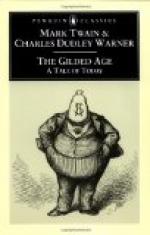Philip Sterling used to say that if he should seriously set himself for ten years to any one of the dozen projects that were in his brain, he felt that he could be a rich man. He wanted to be rich, he had a sincere desire for a fortune, but for some unaccountable reason he hesitated about addressing himself to the narrow work of getting it. He never walked Broadway, a part of its tide of abundant shifting life, without feeling something of the flush of wealth, and unconsciously taking the elastic step of one well-to-do in this prosperous world.
Especially at night in the crowded theatre—Philip was too young to remember the old Chambers’ Street box, where the serious Burton led his hilarious and pagan crew—in the intervals of the screaming comedy, when the orchestra scraped and grunted and tooted its dissolute tunes, the world seemed full of opportunities to Philip, and his heart exulted with a conscious ability to take any of its prizes he chose to pluck.
Perhaps it was the swimming ease of the acting, on the stage, where virtue had its reward in three easy acts, perhaps it was the excessive light of the house, or the music, or the buzz of the excited talk between acts, perhaps it was youth which believed everything, but for some reason while Philip was at the theatre he had the utmost confidence in life and his ready victory in it.
Delightful illusion of paint and tinsel and silk attire, of cheap sentiment and high and mighty dialogue! Will there not always be rosin enough for the squeaking fiddle-bow?
Do we not all like the maudlin hero, who is sneaking round the right entrance, in wait to steal the pretty wife of his rich and tyrannical neighbor from the paste-board cottage at the left entrance? and when he advances down to the foot-lights and defiantly informs the audience that, “he who lays his hand on a woman except in the way of kindness,” do we not all applaud so as to drown the rest of the sentence?
Philip never was fortunate enough to hear what would become of a man who should lay his hand on a woman with the exception named; but he learned afterwards that the woman who lays her hand on a man, without any exception whatsoever, is always acquitted by the jury.
The fact was, though Philip Sterling did not know it, that he wanted several other things quite as much as he wanted wealth. The modest fellow would have liked fame thrust upon him for some worthy achievement; it might be for a book, or for the skillful management of some great newspaper, or for some daring expedition like that of Lt. Strain or Dr. Kane. He was unable to decide exactly what it should be. Sometimes he thought he would like to stand in a conspicuous pulpit and humbly preach the gospel of repentance; and it even crossed his mind that it would be noble to give himself to a missionary life to some benighted region, where the date-palm grows, and the nightingale’s voice is in tune, and the bul-bul sings on the off nights. If he were good enough he would attach himself to that company of young men in the Theological Seminary, who were seeing New York life in preparation for the ministry.




